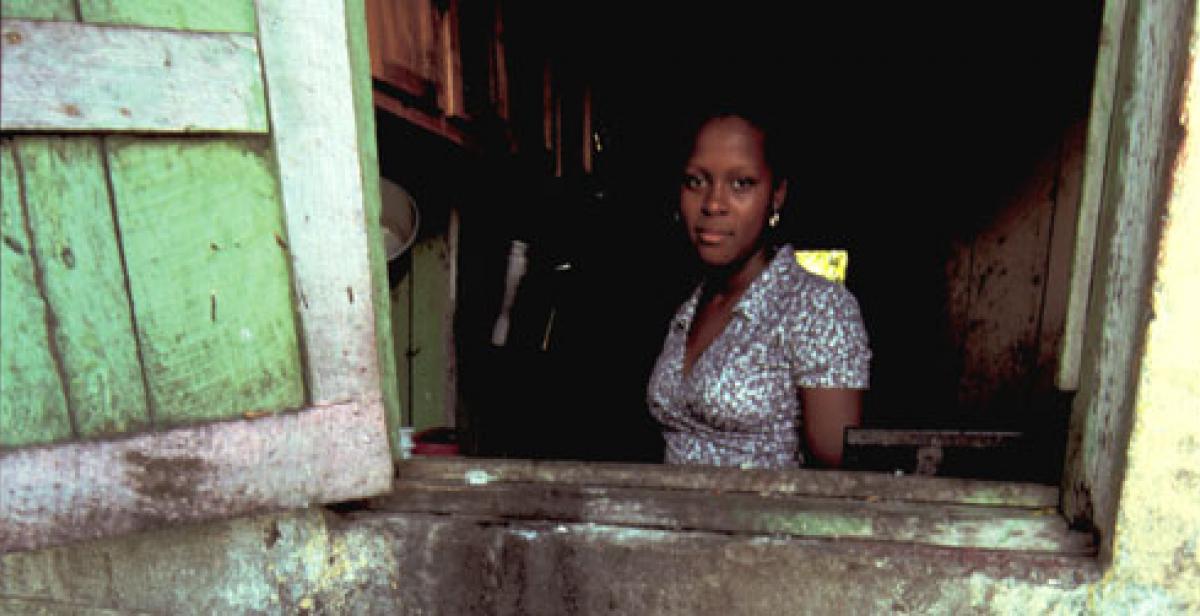Bridget Wooding, who co-authored the Progressio publication Needed but unwanted (2MB PDF), has been awarded an OBE in the New Year honours list for services to human rights in the Caribbean. (The photo above is one of the images from Needed but unwanted.)
Bridget has lived and worked for many years in the Caribbean and has been a vocal advocate for the rights of Haitian immigrants and their descendants in the Dominican Republic. We asked Bridget to tell us what the award means to her.
Were you surprised to get the award?
Yes, because I had no idea that I had been nominated for the award! Also, of the two consecutive decades I have lived and worked abroad, half the time has been more directly with British international co-operation in the Caribbean, while the other half has been working for national NGOs and regional academic institutes.
It means a lot to me because over the last 20 years I have been privileged to be able to support local efforts to promote social change in the region from a rights perspective. I am humbled to know that my grain of sand towards greater social justice in the insular Caribbean has not gone unnoticed.
What was the award in recognition of?
The award was made to me in recognition of my vocation as a humanitarianist for services to human rights in the Caribbean. However, I believe that it is also an accolade for all the international organisations I have had the honour of working with in the region, including Oxfam, ActionAid UK, Progressio, Christian Aid, Save the Children UK, Norwegian ChurchAid and the Jesuit Refugee Service, as well as regional academic institutes such as the Latin America Faculty for Social Sciences Research (FLACSO) and the Ibero-American University (UNIBE).
Progressio, in particular, enabled me to contribute to policy advocacy for the rights of Haitian migrants in the Dominican Republic when the London office commissioned a briefing on the subject in 2004 (2MB PDF). The publication was subsequently translated into both Spanish (2MB PDF) and French (254k PDF).
What’s your view on the situation in Haiti at the moment?
Coincidentally, I was on a work mission in Haiti when the earthquake struck on 12 January, 2010 – I was about to re-launch the Needed but unwanted briefing (2MB PDF) which had been re-issued by the State University of Haiti. This text is being used as a basic text on migration across the island.
I am lucky to be alive since I was in the French Institute in the city centre which, despite dating back to 1945, only half collapsed.
Unfortunately, the situation in Haiti has not got any easier in the ensuing months, as over a million people are still internally displaced and living in makeshift camps. In mid-October the country suffered a further setback with a nationwide cholera outbreak, creeping across the border into the Dominican Republic and resulting in increased inter-ethnic tensions across the island. Last year ended with an inconclusive electoral process in Haiti which may not be satisfactorily completed before the incumbent President Preval is scheduled to leave office in early 2011.
What are the main challenges facing Haiti’s people?
Given Haiti’s early independence and ostracism in the region as well as by metropolitan powers, the country has struggled to overcome two centuries of political instability and questionable aid effectiveness on the part of the international community. The earthquake came on top of a decade of natural disasters, including three potent hurricanes, Gustav, Hannah, and Ike, which in part toppled the Haitian Prime Minister then in office.
The main challenges in this new decade will be to ensure more robust and legitimate national leadership in Port-au-Prince with a view to coordinating better the multiple actors involved in the reconstruction process.
What gives you hope for the future? Is there a particular story from the last year from which we can take heart?
My organisation “Observatory for Caribbean Migrants”, which is based in Santo Domingo (the capital of the Dominican Republic), has been encouraging Haitian and Dominican civil society groups to take stock of the overall response to the humanitarian crisis caused by the earthquake, and look at common advocacy positions across the island from a rights perspective, as well as highlighting good practices.
In a bi-national workshop we helped to host in December 2010, there was one testimony from a young Haitian engineer which was especially moving.
He reported on what he had learned from the Haitian peasants in the south of the country in the context of a transitional housing programme, building seismic-resistant houses which respect the vernacular traditions of the peasants, for those whose homes were destroyed in the earthquake. His view is that only through Haitians organising themselves and ensuring they have opportunities in their own country, will forced migration and its sequel of vulnerabilities be avoided, not just in Haiti but also across the border into the Dominican Republic.
We should take heart from his youthful optimism and strong belief that “another Haiti is possible”.
Bridget Wooding was interviewed on 8 January 2011. Needed but unwanted (2MB PDF) was co-authored by Bridget and the late Richard Moseley-Williams and first published by Progressio (CIIR) in 2004. The publication was subsequently translated into both Spanish (2MB PDF) and French (254k PDF) and has been widely read in Haiti and the Dominican Republic.
The photo is one of the images from Needed but unwanted (2MB PDF) (photo © Luiz Augusto Guimaraes/Progressio)




Comments
what can i say, she deserved
what can i say, she deserved the award ..